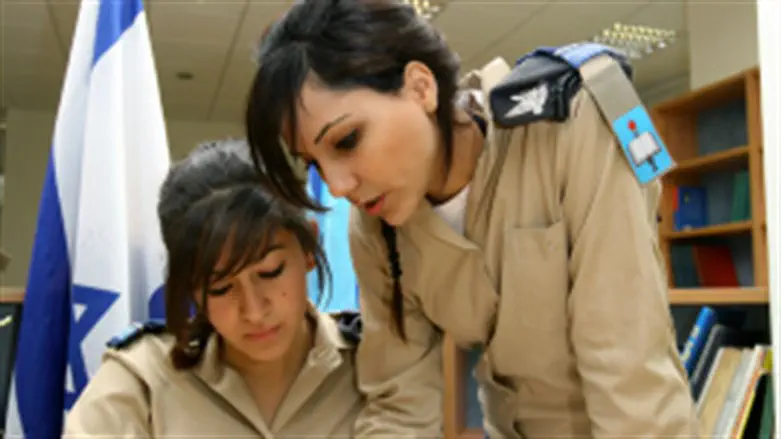
Some were shocked to learn that Israel’s successful ‘Pagergeddon’ operation had been the work of a female intelligence operative under thirty. But they shouldn’t have been.
Israel’s digital intelligence capabilities rely on the work of young women operating in arenas like Unit 8200 which monitors enemy communications, plants surveillance devices and puts together intel data to form a bigger picture, and Unit 414, the unarmed observers on the front line, many of whose members were killed and a number captured during the Hamas invasion on Oct 7.
Women from 8200 and 414 had sounded early warning alerts about Hamas training drills and movements that went unheard before Oct 7. And Unit 414 had lost 27 of its own on Oct 7.
Unit 8200, which is 55% female, had taken some of the blame for the failures on Oct 7. The assault on Hezbollah provided a unique opportunity for Israel’s women to strike back.
‘Pagergeddon’ (or 'The Grim Beeper') went viral on social media but it was only a piece of a bigger puzzle. The Israelis had deconstructed the lessons of Oct 7 and turned them against the Islamic terrorists. Hamas and its Iranian masterminds had wrecked Israeli battlefield communications in the initial attack. Israeli military units were slow to respond, aerial units were unable to strike and hours passed before the military leadership understood the scope of the terrorist assault on the homeland.
The first thing Israel came after were Hezbollah’s communications. ‘Pagergeddon’ was a crucial last step that began with Israel infiltrating Hezbollah’s landlines and then its other communications. When Hezbollah leaders fell back on the pagers and handheld radios, also favored by Hamas, that had been rigged to explode, communications were fatally scrambled.
Hezbollah leaders were forced to begin meeting in person and retreating to bunkers which made it all too easy to take them out. With a broken leadership and communications structure, Hezbollah lacked the ability to decisively move its forces and quickly respond. Within a week, of course, its protectors at the UN and the White House were frantically urging a ‘ceasefire’.
Destroying communications and the chain of command is standard military doctrine, and Israel’s successful implementation of it within such a short time and against one of the world’s largest Islamic terrorist groups will be studied in military academies for generations, but there was also something feminine about breaking apart Hezbollah’s social bonds before a bombing campaign.
While misleading photos and videos of female IDF soldiers carrying rifles circulate on social media, the burden of front line combat is largely handled by men. The killing and capture of unarmed Israeli female observers from Unit 414 remains a deep moral failure. The true role of Israeli women is to act as the invisible heart and soul of the country’s national defense.
When Iron Dome and other interceptor systems take down incoming attacks, the odds are very good that the country’s female air defense controllers are alert and responding. And the extent to which Hezbollah’s communications were penetrated and turned against the terror group owes much to nameless female ‘keyboard warriors’ who exposed the enemy’s weaknesses.
Hezbollah was uniquely vulnerable to these tactics because it was in the awkward stage between terror group and terror state, too big to hide in tunnels, too small to have an effective air defense system, and too dumb to realize that tens of thousands of rockets were still no match for what a first rate air force could do to all its infrastructure and weaponry.
The Iranian-backed Jihadists who had taken over much of Lebanon’s power structure still thought like terrorists even as Hezbollah had grown much too big to function like one.
Terrorist groups start out as individual cells carrying out lone attacks, recruit more members, build militias, seize control of entire areas, transition to guerrillas and then become states. Islamic terrorists naturally adopted the same model employed by Marxist guerrillas across Asia because it was already innate to nomadic raiding culture and foundational to the rise of Islam.
Western militaries perform badly against terrorists and guerrillas, but very well against states.
Islamic armies never achieved much success against Israel, but their terrorists proved quite effective. Peace accords that turned over territory to the PLO and Hamas created safe zones for terrorists inside Israel in which the terrorists were surrounded by civilians who shared their cause of establishing Arab Islamic supremacy over Israel and the entire world.
Hezbollah’s position in Lebanon was much more precarious. Unlike Gaza, Lebanon is genuinely diverse. Apart from its large Christian population, Lebanon contains Arab Sunnis and groups that hate Hezbollah and resent the country turning into an Iranian and Syrian colony.
Mao had advocated that guerrillas should move like fish in the water among the local population. Hamas does this, Hezbollah, like its Shiite counterparts in Iraq, however built an intimidating sectarian power base by controlling entire neighborhoods and areas. Dahieh, the center of Israel’s bombing campaign, is Hezbollahs’s version of Sadr City. Rubbing shoulders with Christians and Sunni Muslims, every move Hezbollah makes is highly visible and reported to the Israelis by both allies and enemies who are eager to see the Shiite terrorist group fall.
Dahieh was not Rafah, it was the Green Zone in Iraq, and Hezbollah was not moving among the people like fish in the water, but like a widely resented occupying army making a lot of noise.
All of that allowed Israel to infiltrate its communications, track its personnel and strike decisive blows against its leaders. Hezbollah had alienated the local population, built up its forces and assumed that the sheer threat of its rocket arsenal would be enough to deter Israel, allowing it to shell Israel’s north with thousands of rockets in order to depopulate the region in preparation for its own version of the Oct 7 attack. But a rocket arsenal is a very crude tool. Like suicide bombs and other terror weapons, it’s useful for attacks carried out from hiding. But the response to a large visible terrorist group isolated in its areas launching rockets is all too obvious.
The inability (progressive unwillingness? ed.)of the Biden-Harris administration to stop the similar Houthi attacks by its sister Iranian-backed terror group out of Yemen had given Hezbollah a false sense of confidence.
Not only did Israel take out the Hezbollah leadership planning an invasion of the Galilee, providing a redeeming narrative for Unit 8200 after the horrors of Oct 7, but Hezbollah had made the fatal mistake of planning to invade Israel from a territory it did not actually control.
Everything that Hezbollah had thought was a strength, its arsenal, its power and its numbers, were actually weaknesses. Outside Iran and Dearborn, Michigan (and maybe Ilhan Omar's Minnesota district, ed.) , Hezbollah has no friends.
Hezbollah is not only widely hated in Lebanon, but in the Arab world. Even the Sunni Arab Muslims clamoring to save Hamas had little more to offer than disdainful shrugs for Hezbollah. The wounds of the Syrian Civil War run deep and many Sunnis hate Hezbollah more than israel.
Israel isolated Hezbollah’s leaders and cut them out, just as it isolated the terror group.
Iran and Qatar had set out to divide Israel. Hamas took hostages, living or dead, while its Qatari backers pushed for rallies that demanded Israel surrender to Hamas to free them. The terrorists had hoped to fracture Israeli society into factions in order to tear it down the way they had torn apart Lebanon. But Israel turned to Lebanon to divide the terrorists and unify Israel.
By attacking Hezbollah, Prime Minister Netanyahu exploited the divisions among the terrorists and reunified Israel around the mission of defeating them. Syrian Sunni Arabs celebrate the downfall of Hezbollah while Shiites lash out at them. Iran is trying to pressure Syria’s dictator to bail out Hezbollah and Iraq’s Sunnis are taking issue with the Shiites dragging them into a war.
Behind the scenes, Israeli women had played a vital unsung role in dividing the terrorists and uniting the country just as they had done in keeping the nation and families together during the war. Countless wives and mothers had watched their husbands go off on deployment after deployment and had kept households going, sometimes from bomb shelters, and then still found time to volunteer and to pray after putting the children to bed.
Thousands of mothers of families displaced by Hezbollah’s rocket attacks have had to do all this without a home to come back to. As the fires burn in Hezbollah compounds, hope rises that all Israelis will be able to return home, that backyards will no longer have to give way to bomb shelters and that Israel’s families may once again know some measure of peace.
And then there is revenge for the October 7th rape, torture and murder of defenseless civilian Israeli women by depraved Hamas invaders.
In the Bible, the Prophetess Devorah had predicted that “into the hand of a woman the Lord will deliver Sisera”. And in her song she described Sisera’s mother being comforted with promises that the Canaanite general and his armies were seizing women and loot. “Are they not finding and dividing the spoils? A girl or two for every man?” she imagines them saying and concludes with “So may perish all Your enemies, O Lord.” Once again history repeats itself.
And many a woman has repeated the same words and sentiments tonight in Israel.

